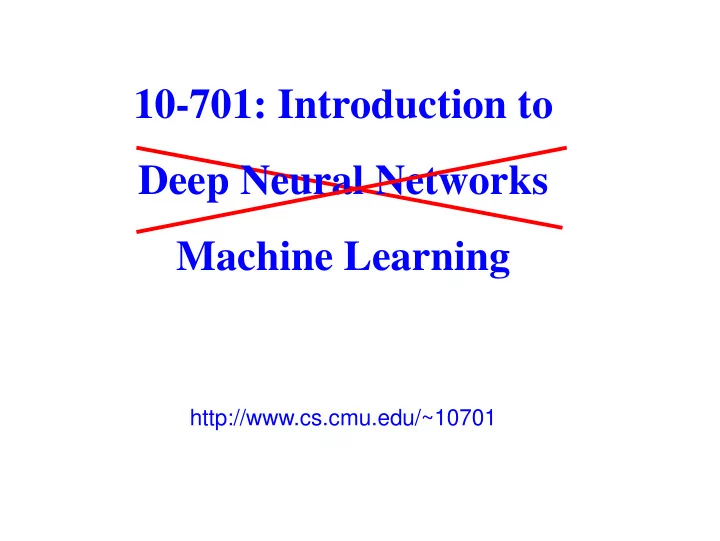

10-701: Introduction to Deep Neural Networks Machine Learning http://www.cs.cmu.edu/~10701
Organizational info • All up-to-date info is on the course web page (follow links from my page). • Instructors - Nina balcan - Ziv Bar-Joseph • TAs: See info on website for recitations, office hours etc. • See web page for contact info, office hours, etc. • Piazza would be used for questions / comments and likely for class quizzes. Make sure you are subscribed.
Maria-Florina Balcan: Nina • Foundations for Modern Machine Learning • E.g., interactive, semi-supervised, distributed, multi-task, never- ending, privacy preserving learning • Connections between learning theory & other fields (algorithms, algorithmic game theory) Game Theory Approx. Discrete Algorithms Optimization Machine Learning Theory Control Matroid Theory Theory Mechanism Design • Program Committee Chair for ICML 2016 (main general machine learning conference) , COLT 2014 (main learning theory conference)
Sarah Schultz (Assistant Lecturer) sschultz@cs.cmu.edu GHC 8110 Research Interests: Educational data mining and Intelligent Tutoring Systems
Ellen Vitercik Email: vitercik@cs.cmu.edu Office hours: Friday 10-11 in GHC 7511 Research interests: Theoretical machine learning Computational economics
Logan Brooks (lcbrooks@andrew) • Office space: GHC 6219 • Office hours: Monday 10-11 • Research topic: epidemic forecasting - Time series - Ensembles
Yujie Xu (yujiex@andrew.cmu.edu) • GHC 5th floor common area near entrance • Office Hours: Mon 4:30-5:30 • Research topic: data-driven building energy models − regression − impact evaluation
Easwaran Ramamurthy eramamur@andrew.cmu.edu • Find Me: GHC 7405 • Office Hours: Tuesday 4-5 • Interests: - Computational Genomics - Deep learning applications in regulatory genomics - Alzheimer’s Disease
Chieh Lin (chiehl1@cs.cmu.edu) Office: GHC 8021 Office Hours: Thursday 10:30-11:30 Research Interest: 1. ML Applications in biological/medical Data 2. Neural Networks/Deep Learning
Matt Oresky (moresky@andrew.cmu.edu) Office Hours: Tuesday 9:30 – 10:30 AM GHC 6 th floor common area (by the kitchenette) Interest: Natural Language Processing
Akash Ramachandran (akashr1@andrew.cmu.edu) Office hours : Friday 3-4pm Interests: Application of ML in Biology Software Development in Java Playing the tabla (an Indian drum)
Guoquan Zhao (guoquanz@andrew.cmu.edu) Find me: GHC 6 th floor common area Office Hours: Thursday 3.30 pm – 4.30 pm Interest: Active Learning Distributed ML system
• 8/28 Introduction, MLE • Intro and classification 8/30 Classification, KNN • (A.K.A. ‘supervised 9/4 – no class, labor day • 9/6 – Decision trees / problem set 1 out learning’) • 9/11 – Naïve Bayes • 9/13 – Linear regression • 9/18 – Logistic regression • 9/20 – Graphical Models, MRF/ PS1 due, PS2 out • Graphical models 10/25 (Wednesday): Midterm 9/25 – Graphical Models, BN 1 • 9/27 – Graphical Models, BN 2 • 10/2 – Perceptron • 10/4 – Kernel Methods/ PS2 due, PS3 out • 10/9 – Support Vector Machines • Non linear and kernel 10/11 – Neural networks 1: Backpropagation • 10/16 – Neural networks 2: Deep NN/ project proposals due methods • 10/18 – Ensemble Learning, Boosting / PS3 due • 10/23 – Active Learning • 10/25 Midterm/ PS4 out • 10/30 – Dimensionality Reduction • 11/1 – Unsupervised learning (clustering) Unsupervised learning • 11/6 – Semi supervised learning • 11/8 - Generalization, overfitting I / PS 4 due, PS 5 out • Theoretical considerations 11/13 – Model Selection. • 11/15 – Hidden markov models – learning • 11/20 – HMM – inference Reasoning under • 11/22 – no class, thanksgiving break • uncertainty 11/27 – MDPS • 11/29 – Reinforcement Learning / PS 5 due • 12/4 – Distributed ML? • 12/6 – Final review
Grading • 5 Problem sets (5 th has a higher weight) - 45% • Final - 30% • Midterm - 20% • Class participation - 5%
Class assignments • 5 Problem sets - Most containing both theoretical and programming assignments - Last problems set: mini project • Exams - Midterm (10/25) - Final Recitations - Twice a week (same content in both) - Expand on material learned in class, go over problems from previous classes etc.
What is Machine Learning? Easy part: Machine Hard part: Learning - Short answer: Methods that can help generalize information from the observed data so that it can be used to make better decisions in the future
What is Machine Learning? Longer answer: The term Machine Learning is used to characterize a number of different approaches for generalizing from observed data: • Supervised learning - Given a set of features and labels learn a model that will predict a label to a new feature set • Unsupervised learning - Discover patterns in data • Reasoning under uncertainty - Determine a model of the world either from samples or as you go along • Active learning - Select not only model but also which examples to use
Paradigms of ML • Supervised learning - Given D = {X i ,Y i } learn a model (or function) F: X k -> Y k • Unsupervised learning Given D = {X i } group the data into Y classes using a model (or function) F: X i -> Y j • Reinforcement learning (reasoning under uncertainty) Given D = {environment, actions, rewards} learn a policy and utility functions: policy: F1: {e,r} - > a utility: F2: {a,e}- > R • Active learning - Given D = {X i ,Y i } , {X j } learn a function F1 : { X j } -> x k to maximize the success of the supervised learning function F2: {X i , x k }-> Y
Recommender systems Primarily supervised learning
semi supervised learning
Driveless cars Supervised and reinforcement learning
Helicopter control Reinforcement learning
Deep neural networks Supervised learning (though can also be trained in an unsupervised way)
Distributed gradient descent based on bacterial movement Reasoning under uncertainty
Recommend
More recommend